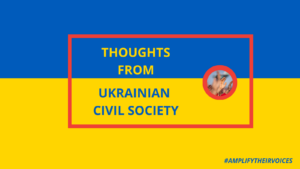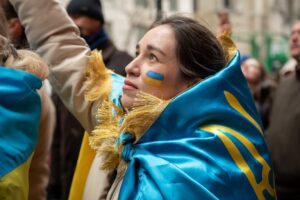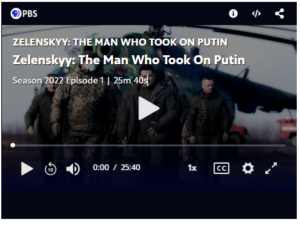There are three Ukraine scenarios which currently seem most likely, argues FT analyst Gideon Rachman:
- The first — which is both the most tragic and the most probable — is that this war continues for many months.
- The second possibility — put it at maybe 30 per cent — is that there is a peace settlement.
- The third scenario — which is perhaps 10 per cent — is that there is some sort of political upheaval in Russia, involving the overthrow of President Vladimir Putin and a new approach to Ukraine.
There will be disagreement and distress throughout the Russian system — but coordinating that into an effective plot to remove Putin may not be possible, he adds. So those are the three options: a prolonged war; a peace settlement; or a coup in Russia. Expect the first, work for the second and hope for the third.
 The European Union is setting up a Ukraine post-war reconstruction fund, Reuters reports. Some EU politicians have called for the use of Russian assets frozen by the West, including some $300 billion of Russian central bank reserves, as reconstruction money for Ukraine once the aggression ends.
The European Union is setting up a Ukraine post-war reconstruction fund, Reuters reports. Some EU politicians have called for the use of Russian assets frozen by the West, including some $300 billion of Russian central bank reserves, as reconstruction money for Ukraine once the aggression ends.
“Member States and civil society have shown remarkable solidarity and the EU is stepping up its action to ensure that the necessary support reaches all those who are hosting them,” EU Commissioner for Cohesion and Reforms, Elisa Ferreira, said today. “This is why, after the CARE [Cohesion’s Action for Refugees in Europe] proposal, cohesion policy will advance €3.4 billion from REACT-EU to Member States, notably those in the frontline, to help meet their needs.”
But Ukraine’s foreign minister, Dmytro Kuleba, told The Economist that his country needs more support—and that the European Union “is backsliding back to its normality where it cannot decide on strong and swift action”. The EU – launched a Ukrainian civil society hub – has been struggling to preserve the united front Russian aggression has enabled it to show.
U.S. Sen. Joni Ernst, R-Iowa, who led a bipartisan congressional delegation to Poland and Germany over the weekend, said lawmakers spoke with Ukrainian civil society leaders who “delivered a clear message to the United States, and that message was: We need more lethal aid, and we need it as soon as possible,” NBC News reports.
 Experts report an “unprecedented” outpouring of aid for food, medicine and other essential needs of Ukrainians. Comparatively few donations, though, have been earmarked for maintaining Ukraine‘s culture or democratic foundations. So Open Society Foundations has launched the Ukraine Democracy Fund with a $25 million pledge, in hopes of raising $100 million, ABC News reports.
Experts report an “unprecedented” outpouring of aid for food, medicine and other essential needs of Ukrainians. Comparatively few donations, though, have been earmarked for maintaining Ukraine‘s culture or democratic foundations. So Open Society Foundations has launched the Ukraine Democracy Fund with a $25 million pledge, in hopes of raising $100 million, ABC News reports.
“Ukraine is a story about democratic success, not failure,” said OSF’s Mark Malloch-Brown. “One can’t find many silver linings to this horrific situation, but under Zelenskyy, it was becoming this glorious, New York-like hodgepodge of opinions and views — a real rainbow of pluralism.”
“Keeping civil society alive absolutely is the key bit,” said Malloch-Brown, who also served as the United Nations deputy secretary general. “Otherwise, it’s a hollow victory. If you neglect or lose that civil society piece, you’ve lost what this was ultimately all about.”

NDI
Ukraine should give investors second thoughts on China, argues Sam Goodman, a senior policy advisor at Hong Kong Watch and director of the China Risks Institute, which will launch in May 2022. Russian President Vladimir Putin’s war has shown that autocracies aren’t safe bets, he writes for Foreign Policy.
In their scramble to counter Russian President Vladimir Putin’s murderous revanchism, Western leaders seem increasingly open to striking Faustian bargains with other authoritarian regimes, notes Central European University’s Maciej Kisilowski.
By embracing Poland’s quasi-authoritarian regime in the interest of using the Polish border as an access point to Ukraine, Western powers have struck yet another bargain that they will come to regret. The lessons from the deal made with Turkey during the 2015 refugee crisis have been forgotten – or simply ignored, he writes for Project Syndicate.
But such compromises are essential since it is misleading to frame the conflict in Ukraine in terms of a global “battle between democracies and autocracies,” The FT’s Janan Ganesh argues. Inducing a change in Russia’s behavior is likely to require the co-operation of the oil-rich Saudis, the strategically located Turkey and a Chinese state that has the wherewithal to cushion Russia against sanctions. That none of these countries are liberal democracies doesn’t reduce their circumstantial usefulness.
 Fear of popular democratic revolutions drove Putin to attack Ukraine, according to analysts Isabella Cuomo and Leyla Latypova.
Fear of popular democratic revolutions drove Putin to attack Ukraine, according to analysts Isabella Cuomo and Leyla Latypova.
The Kremlin’s fear of a fresh popular revolution threatening its position in power isn’t far-fetched; history favors nonviolent movements, which boast a 53% success rate compared with the 26% success rate for violent campaigns, they write for the NewLines Institute. In Russia’s neighborhood, civil resistance has proved itself to be a particularly potent strategy – between 1900 and 2019, 58% of the region’s major nonviolent movements succeeded in achieving their goals.
THURSDAY 3/24 The National Endowment for Democracy and Atlantic Council host a @TwitterSpaces conversation on the state of Ukraine’s civil society during wartime. NED’s Damon Wilson opens the conversation, moderated by Melinda Haring with Hanna Hopko & Oleh Rybachuk. Join here.
THURSDAY 3/24 | @NEDemocracy @ACEurasia will host a @TwitterSpaces conversation on the state of Ukraine’s civil society during wartime. @DamonMacWilson opens the conversation, moderated by @melindaharing with @HopkoHanna & @olehrybachuk. Join us here:
https://t.co/kjEfLzoY1Q— NEDemocracy (@NEDemocracy) March 22, 2022
Check out International IDEA’s event (below); Russia’s War Against Ukraine – Implications for Democracies and Democracy Support in the EaP Region
.







